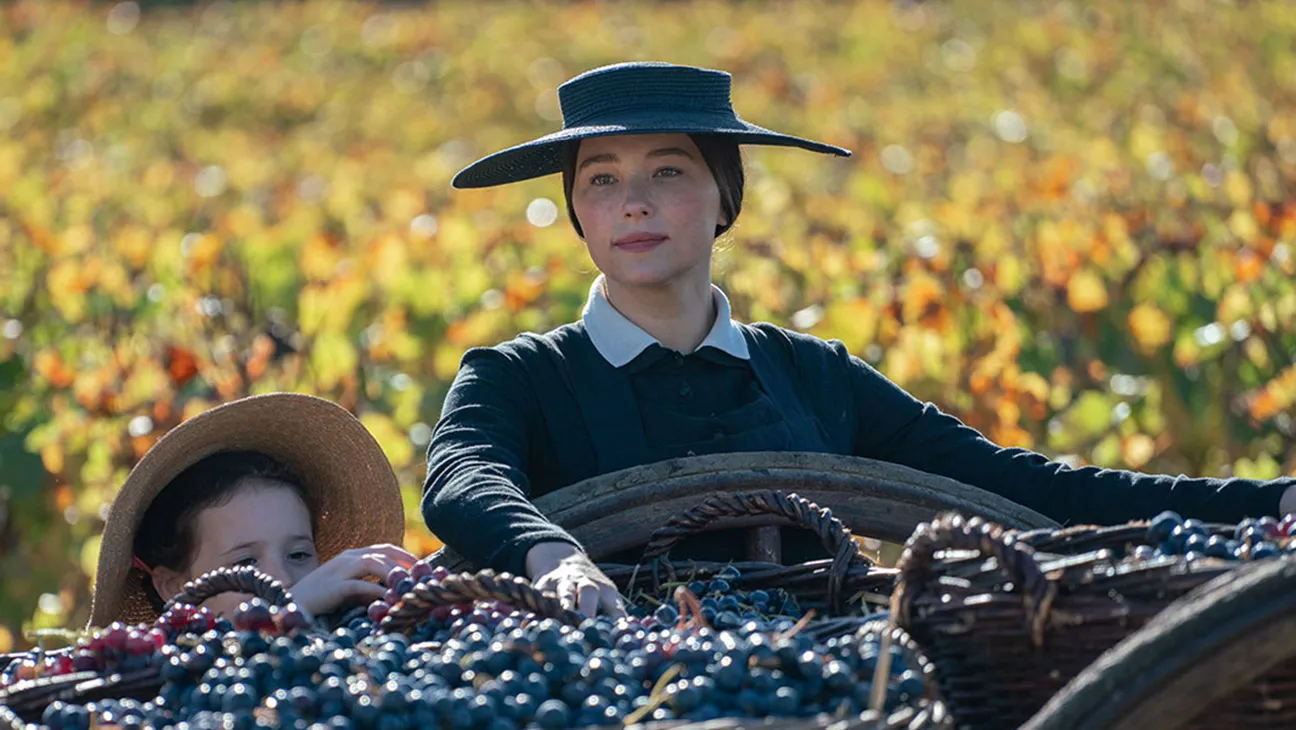Film Review: Widow Clicquot
Film
Widow Clicquot
Director: Thomas Napper
Fourth and Twenty-Eight Films
In Theaters: 07.19
The most interesting love stories are rarely simple, and we never know the truth about a relationship merely by viewing it casually from the outside. Widow Clicquot is a period piece, a costume drama, and a biopic—but at its heart, it’s a spellbinding story of selfless love, as well as self-love.
In 1805, winemaker François Clicquot (Tom Sturridge, Being Julia, The Sandman) dies suddenly, leaving his wife, Barbe-Nicole Ponsardin Clicquot (Haley Bennett, The Magnificent Seven, Cyrano) a widow and a single mother at age 27. When François’ father, Philippe (Ben Miles, Napoleon) announces his plans to sell François’ vineyards to make things financially secure for Barbe-Nicole and her daughter, Clementine (Cecily Cleeve, The Marvels), Barbe-Nicole reminds him that the vineyards were left to her in Francois’ will, and she insists on keeping them and preserving her husband’s legacy. Despite major financial obstacles, a war in France, and a political climate that doesn’t take kindly to a female business mogul, Barbe-Nicole navigates the challenges with steadfast resolve, and in the process transforms the business into a resounding success that revolutionizes the entire champagne industry. As she works closely with Louis Bohne (Sam Riley, Radioactive, Maleficent), the wine merchant for the vineyard and a close friend of François, her innovative methods and refusal to give up turn her into a true pioneer of industry.
Widow Clicquot is a marvelous tale, and not merely because the accomplishments of its titular character are so impressive. This is a story that stands both because of the way that it is told, and because of the story behind the story. Flashbacks gradually reveal glimpses of the courtship and the marriage between François and Barbe-Nicole, with Francois romantically quoting Voltaire and introducing her to the majesty of his vineyards, highlighting his passionate vision. As the film progresses, they also slowly bring to light a complicated relationship marred by his severe battles with depression and other mental illnesses. Barbe-Nicole’s love story was both a dream of finding her true companion and a nightmare of trying to support him through afflictions and mood swings that are a serious struggle to deal with even now, with modern medications and therapy, and she was doing so largely alone while keeping the vineyard operations moving as well. The more we see of the difficulties and pain that the couple faced, intercut with the current story of Barbe-Nicole’s relentless work to build a business empire, the more we come to admire this remarkable woman and her tragically troubled husband. While her love for Francois and his dreams drive her, it’s ultimately the refusal to let anyone—including herself—deny her the respect that she’s earned that is most striking.
Director Thomas Napper approaches the material with an emphasis on subtlety and inward reflection, peeling back layers and revealing the drama beneath the surface. There’s a surreal and often dreamlike quality to the early flashbacks, with them becoming more stark and present as we see more of the difficult times. The cinematography by Caroline Champetier (Looking For Her, The Damned Don’t Cry) is breathtaking, and the costume and production design are pitch-perfect. Still, even with top-tier production values, it’s the whip-smart screenplay by Christopher Monger (The Englishman Who Went Up A Hill But Came Down a Mountain) and Erin Dignam (Land) combined with Napper’s stellar direction that make this a vintage worth savoring.
Bennett is marvelous in the title role, and her performance is an acting masterclass. Bennett flawlessly finds the truth of the character, staying firmly in the moment throughout, as the fragmented nature of the structure requires jumping into scenes fraught with emotion out of sequence and with little introduction, and also absorbs the character, as we see the sum of every one of Barbe-Nicole’s experiences and her strength reflected in her face and body language in the final scene. Sturridge’s Francois is alternatively joyous, irresistible, pitiable, and haunting, and Miles has some very touching moments as we get to know Phillipe’s softer side. Riley’s combination of roguish charm and genuine warmth create a vivid and memorable character in Louis Bohne, and Anson Bloom (Crawl, 1917) makes a strong impression as Edouard Werle, Madame Clicquot’s devoted young accountant.
Widow Clicquot moves by quickly at only a 90-minute runtime, and it’s easy to dismiss as a series of scenes and vignettes rather than a story—yet those individual moments connect to paint such a vivid portrait of such an extraordinary person that by the time it’s over, it’s both overwhelming and inspiring. There’s no need to have any affinity for wine or champagne to feel the intoxicating effects of Widow Clicquot, or to appreciate its delicate and delicious bouquet. –Patrick Gibbs
Read more film reviews:
Film Review: Twisters
Film Review: The Convert

